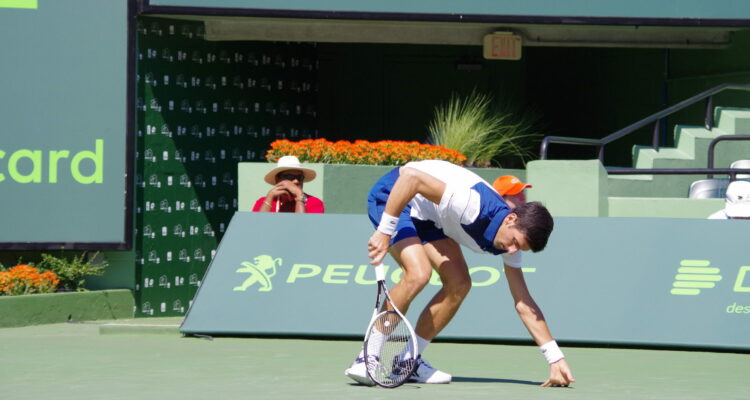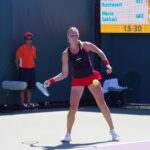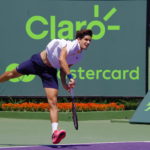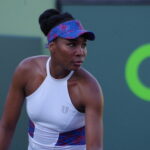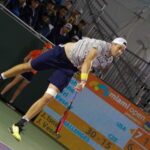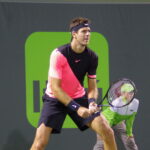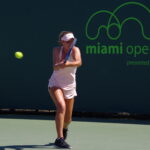WASHINGTON, March 24, 2018 (by Michael Dickens)
Novak Djokovic would just as soon forget his 2018 Miami Open presented by Itaú experience because it was all too brief.
While the former No. 1 and six-time Miami Open champion can still pack big stadiums – and he was given a prime, mid-Friday afternoon court time on the Stadium court at Crandon Park on Key Biscayne, perhaps in recognition of his past achievements – the 30-year-old Serbian gave anything but a memorable performance against the unseeded, No. 47 Benoit Paire of France.
Djokovic lost to Paire, 6-3, 6-4, in a match that needed just 67 minutes to decide its outcome. Paire broke his outmatched – and far from dominant – opponent four times and he faced just one break on his own serve. There was no spark in Djokovic’s game, evidenced by many poorly hit returns, as he continues to struggle coming back from right elbow surgery. His performance, which ended when he was broken at love in the final game of the match, left little for his fans to cheer about.
Further, the loss to Paire ended Djokovic’s 21-match winning streak against Frenchmen. He had been 58-1 against French competitors since the 2010 Davis Cup final against France.
“I’m trying, but it’s not working, and that’s all it is,” said Djokovic after his loss, during his post-match meeting with the media.
After the match ended and the players shook hands, Tennis Channel analyst Justin Gimelstob – himself a former ATP Tour professional from the United States – was prompted to offer this honest assessment of Djokovic: “There are a lot more questions than answers from the former World No. 1 now.”
It was just Djokovic’s second defeat in his last 32 matches at the Miami Open and ended a 16-match winning streak at Crandon Park that goes back to 2013. He won three consecutive Miami Open singles titles in 2014-16, then missed last year’s tournament because of injury.
Just how bad did the 12th-ranked Djokovic, seeded ninth this year in Miami, play Friday? Well, by all appearances, there was little passion or competitive fire, which usually are a given. Djokovic’s emotional tank seemed at or near empty. His confidence is low and his fitness level following last year’s six-month injury layoff – and subsequent elbow surgery earlier this season – is down. He has now lost three consecutive matches for the first time since the 2007 Masters Cup in Shanghai. One has to wonder if Djokovic’s elbow has properly healed?
Whether it’s too early this season to properly assess his comeback, Djokovic’s results have been disappointing – and surprising, too. Before losing to Paire, he fell to Hyeon Chung of South Korea in the fourth round at the Australian Open and followed it with a second-round loss to Taro Daniel of Japan, a 109th-ranked qualifier, at Indian Wells.
British tennis journalist Simon Cambers, who has been providing radio commentary for ATP Tennis Radio this week from Miami, seemed quite surprised by what he saw from Djokovic against Paire. He tweeted:
Just very strange watching DjokovIc like this. Way, way off his old form and really not looking like he cares
— Simon Cambers (@scambers73) 23. März 2018
In better days – as recent as 2016 to be exact – Djokovic held all four Grand Slam singles titles. Now, that seems to be a distant memory. “I’m not at the level they would like to see me at and I would like to see myself at,” said Djokovic. “But it is what it is, and life goes on.”
It’s over, but what a winning streak for Osaka
It had to end sooner or later, but what a run for Naomi Osaka. In Friday’s opening match on Stadium court, Osaka lost to No. 4 seed Elina Svitolina of Ukraine, 6-4, 6-2. The loss ended a remarkable – and breakthrough – eight-match winning streak by the 20-year-old rising Japanese star, who convincingly won the BNP Paribas Open at Indian Wells last Sunday over Daria Kasatkina of Russia. During the winning streak, she scored wins over a pair of former No. 1 players, Maria Sharapova and Karolina Pliskova, and followed it with an impressive victory over World No. 1 Simona Halep.
The unseeded, 22nd-ranked Osaka, who two days earlier upset eight-time Miami Open champion Serena Williams in the first round, began feeling ill before her match on Friday. However, the match went on, and Osaka said during her press conference after losing to Svitolina that she didn’t want to retire despite being sick.
Over the course of the 1 hour and 22 minute match, Osaka double faulted four times as she struggled with her both her first and second serves. Also, she was broken four times, won just 15 points on Svitolina’s serve, and was outpointed 75-52.
Soon after the match, Osaka took to social media and shared a tweet with her fans:
Time to take a breakkkkkkkk 🎉🎉🎉
— NaomiOsaka大坂なおみ (@Naomi_Osaka_) 23. März 2018
Federer the person, not the tennis superstar
Top-seeded Roger Federer is playing the Miami Open for the 17th time – and first time as World No. 1 since 2010. On Thursday, the 36-year-old defending champion sat down with Michelle Kaufman of the Miami Herald and answered 10 questions – and most of them had nothing to do with tennis! Yet, they offered a great insight into Federer the person – not just Federer the tennis superstar.
Among my favorites:
Q: Have you ever driven in Miami?
A: “Yes, of course. I’m at the wheel 90 percent of the time here. I like driving in America because in general you can overtake left and right on the highways, which in Switzerland you’re not allowed to do. There, you can only overtake left, and if you overtake right, you get a fine. Also, I like to turn right on red in America. It’s like, hey, look at that, I’m turning even though the light is red. So, that’s good for traffic. I enjoy it. It gives me a sense of freedom. I put the windows down, turn the music up, it’s great. I love it.”
Q: As the parent of four young children – two sets of twins – what parenting advice would you give to parents of twins or multiple kids?
A: “I try to spend alone time with two kids at a time. Sometimes I can get a half hour alone time with one at a time, but with four, it’s hard to find the time. The problem when you have a lot of kids, sometimes you stay on the surface a bit too often, and you need to talk to them. In the end of the days, between six and nine o’clock, when they go to bed, this is when everything unwinds and you can talk to them about how they’re feeling, do they need to tell me anything? For me, it helps to have a schedule for the kiddies. You have to maintain a rhythm with bedtime and meals, bathing. Wherever we are in the world, they know that’s a given. The rest of the day is playful and educational.”
Q: Life mantra you live by?
A: “Respect everyone. Be honest. I once heard this saying, it said ‘It’s nice to be important, but it’s more important to be nice.’ I heard that way back when I was 18, and I feel it sums up how I feel.”
The last word
After Novak Djokovic’s loss to Benoit Paire, New York Times tennis columnist Christopher Clarey, the dean of U.S. tennis writers, shared some solid insight when he tweeted:
Serena and Djokovic reminding us that this comeback thing is actually a very tricky thing.
— Christopher Clarey (@christophclarey) 23. März 2018
About the author
Michael Dickens is a Washington, D.C.-area freelance journalist who writes and blogs about tennis.
Photo Gallery (by Brigitte Urban)
- Feliciano Lopez
- Mikael Ymer
- Michael Mmoh
- Elina Svitolina
- Anett Kontaveit (photo: Brigitte Urban)
- Daria Kasatkina (photo: Brigitte Urban)
- Maria Sakkari
- Naomi Osaka
- Roberto Baustista Agut
- Milos Raonic
- Marin Cilic
- Pierre-Hugues Herbert (photo: Brigitte Urban)
- Richard Gasquet
- Jeremy Chardy
- Novak Djokovic
- Benoit Paire
- Novak Djokovic
- Thanasi Kokkinakis
- Jelena Ostapenko (photo: Brigitte Urban)
- Timea Babos
- Venus Williams (photo: Brigitte Urban)
- Venus Williams
- Petra Martic
- Kristina Mladenovic
- Jiri Vesely
- John Isner (photo: Brigitte Urban)
- Grigor Dimitrov
- Maximilian Marterer
- Robin Haase
- Juan Martin Del Potro (photo: Brigitte Urban)
- Sofia Kenin (photo: Brigitte Urban)

